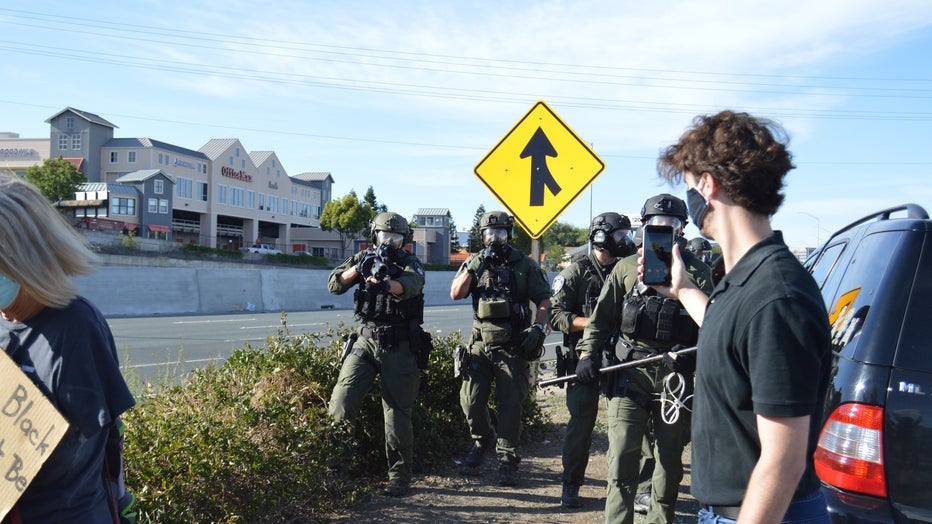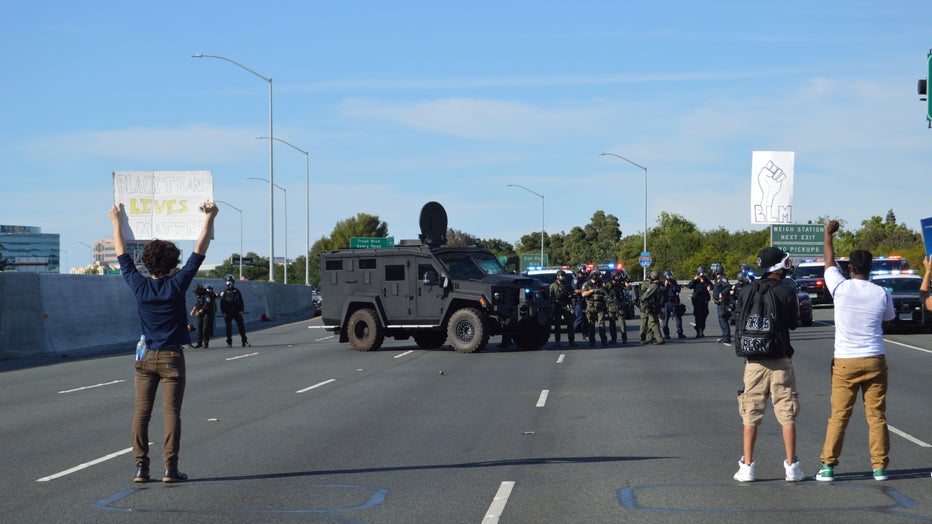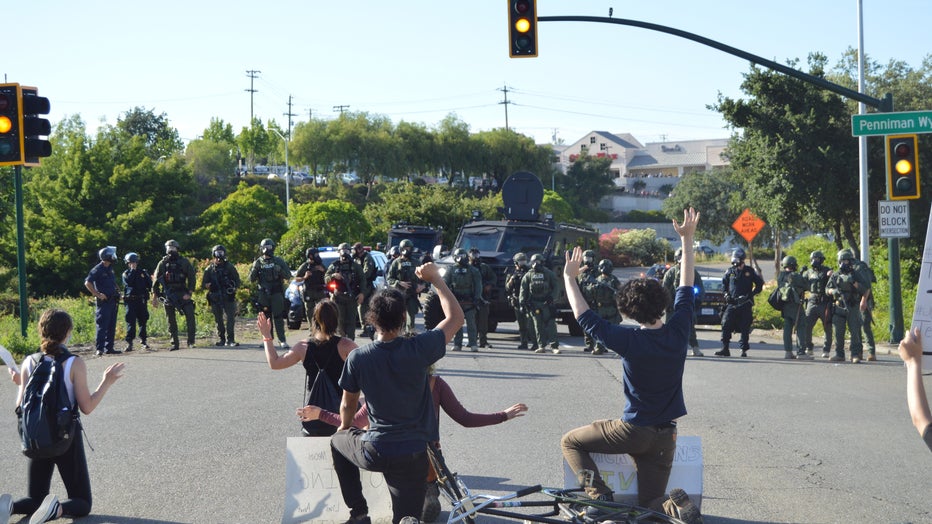East Bay cities pay $3.4M after rubber bullets cause young woman's brain injury
WALNUT CREEEK, Calif. - Three East Bay cities settled a $3.4 million civil lawsuit with a young woman after police officers struck her head with rubber bullets, causing a brain injury that still affects her memory and concentration.
It is the highest publicly known sum stemming from the Bay Area George Floyd protests three years ago. The settlements came from Walnut Creek, San Ramon and Pleasant Hill.
The amount was agreed to in April, but Sarah Tuning, now 27, hasn't felt ready to share her story until now.
"This shouldn't have happened to me, and it shouldn't happen to anyone," Tuning said in her first interview since being injured on June 1, 2020.
KTVU emailed the city managers and communications teams of each city. Only Walnut Creek responded, saying that their portion was $100,000 and that they didn't admit any fault. It's not clear how much San Ramon and Pleasant Hill paid apiece, as their city managers did not answer inquiries.
The city's statement did, however, say that Walnut Creek has since modified its crowd control practices at large protests and no longer uses tear gas and has "expanded" its non-lethal weaponry, including using bean bag shotguns, bola wraps and "enhanced" Tasers."
As Tuning tells the story, she joined the George Floyd protest in Walnut Creek to document what was happening and to provide nourishment and medical assistance, if necessary.
"I just wanted everyone to be OK," she recalled in a Zoom interview from her new home in Idaho.
So, she packed up a backpack of First Aid products, snacks and a camera.
"I wanted to make sure everyone was keeping up their blood sugar and their wounds were bandaged," Tuning said.
At about 6 p.m., police announced a curfew and that the crowd needed to disperse, or they would be fired upon with tear gas and non-lethal projectiles called 40-millimeter sponge rounds, commonly known as rubber bullets.
And from then on, Tuning's memory is a little fuzzy.
"It was really confusing," Tuning said.
She said she began to leave the area and was walking out in the only direction law enforcement was letting them exit, where tear gas canisters had recently been deployed.
An MRAP armored vehicle was driving around and K-9 units were out in force.
She said it was loud and smoke was everywhere.
She remembers being shuttled toward downtown Walnut Creek and crying before she was hit in the forehead with a rubber bullet.
"I couldn't see or hear anything," she said.

Sarah Tuning's injuries after being hit with a rubber bullet in Walnut Creek on June 1, 2020. US District Court
By most accounts, the protest that day was chaotic and law enforcement from all over the East Bay came to oversee – and quell – the protest.
In Walnut Creek's statement, police were trying to deal with objects throwing objects at officers and protesters who had moved onto Interstate 680 to block traffic.
In response, police fired a sponge round at a man who had thrown a tear gas cannister at them.
"One of the rounds may have hit Ms. Tuning in the head, causing a brain injury," Walnut Creek's statement said.
Tuning is still not sure exactly which officer fired the sponge round at her. Neither is the city of Walnut Creek.
Someone eventually picked her up and she was able to call her father who took her to the hospital.
She shared a photo of herself with severe bleeding above her eye area. Her photo was also captured by a freelance photographer for the San Francisco Chronicle, it shows blood streaming down her face, though she wasn't identified by name in the image.
At first, doctors diagnosed her with a concussion.
But she continued to vomit for several days and learned that she had a brain bleed.
Even though her brain bleed didn't grow, Tuning said she's not the same.
To this day, Tuning has problems remembering to respond to emails, organizing her day and thinking clear thoughts. She said her friends have nicknamed her Dory, the absent-minded fish character in the movie, Finding Nemo.
For now, she's living with family, tending to animals on four acres of land and figuring out what she wants to do next, like possibly becoming a paralegal, if she recovers and can function better in the future.
"I don't know what a reasonable standard is for me anymore," Tuning said. "I used to be capable. Now, I have no idea what I'm capable of."
No money is worth what she has to live with, despite her award being quite significant.
Oakland, for example, paid $1.5 million to cover attorney's fees and damages for 25 protesters after they alleged police violated their rights during the George Floyd protests of 2020. Two other people in Oakland settled for $250,000 after police shot them in the hip and calf, respectively.
San Jose paid $3 million to settle its excessive force case involving several plaintiffs, including Michael Acosta lost an eye after police fired rubber bullets at him. Acosta received $2.9 million, while four others split the remaining $450,000.
Tuning's attorney, Sanjay Schmidt of San Francisco, said that he hopes this large settlement will deter "the future use of kinetic impact projectiles from being needlessly used at peaceful protests."
Schmidt added that he hopes this case will "precipitate reforms" so that future use of less-than-lethal crowd control weaponry will be tracked and restricted to prevent such serious injuries in the future.
As for why she filed suit, Tuning said she was raised to believe that she lives in a society with you can exercise your First Amendment rights freely and safely.
"And I thought I was going to exercise a right that I had," she said. "And I was not able to do it freely and safely. I don't think that that's something that anyone should have to consider before they go out to exercise their rights in any country."
Lisa Fernandez is a reporter for KTVU. Email Lisa at lisa.fernandez@fox.com or call her at 510-874-0139. Or follow her on Twitter @ljfernandez

An officer in riot gear holds a gun at the June 1, 2020, George Floyd protest in Walnut Creek. Photo; Sarah Tuning

Officers point guns at the June 1, 2020, George Floyd protest in Walnut Creek. Photo; Sarah Tuning

People hold up signs at the June 1, 2020, George Floyd protest in Walnut Creek. Photo; Sarah Tuning

Protesters kneel at the June 1, 2020, George Floyd rally in Walnut Creek. Photo; Sarah Tuning

